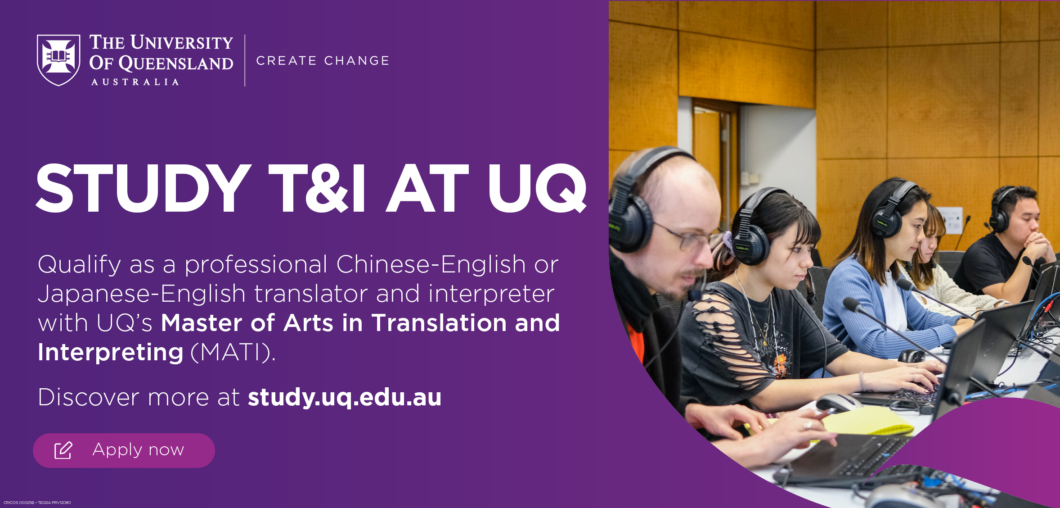When AUSIT National President J Angelo Berbotto was introduced to Patrick Parsons – a student member volunteering at the organisation’s National Conference 2022 last November, and about to graduate with a master’s degree in T&I – he was struck by Patrick’s passion for his chosen field. We asked Patrick to tell us how this passion developed.

‘I didn’t want to just wield sounds like blunt objects, I wanted to convey meaning with context.’
As a native English speaker with no CALD heritage or second language, I found the thought of learning a new language from start to finish daunting. Growing up in a monolingual environment only heightened this feeling.
Starting out, though, my goals weren’t to ‘learn a second language’ or ‘learn Japanese’ – these were natural steps that stemmed from a desire to immerse myself in Japanese culture: watch Japanese music videos and TV programs without subtitles; understand, write, read and think in Japanese; and finally, help Japanese and English speakers to communicate with each other.
Like many people first exposing themselves to a new culture, my initial understanding of Japanese came through popular culture: in my case, anime (a style of animation – both hand drawn and computer generated – originating from Japan). Rather than fight the endless battle of ‘subbed versus dubbed’, I thought, ‘Why not learn to understand it without either?’ At heart, I wanted to understand the meaning as it was originally conveyed, unfiltered and authentic.
Jumping straight into formal study didn’t seem like an effective way to achieve this. I started small, and through doing so began to realise that these small steps would eventually coalesce into a larger understanding. My first step was using the online language-learning tool Rosetta Stone – I failed its voice recognition tests with astounding regularity. Slowly though, through trial and error, I improved my pronunciation and basic phrases … but I was still unable to fully connect with the culture I enjoyed.
Rosetta Stone was also incapable of answering any of the many questions I was starting to ponder. What it didn’t teach me was rules. Every language has them. Again, I came back to my desire for understanding: I wanted to know not just what to say and when, but also why. I didn’t want to just wield sounds like blunt objects, I wanted to convey meaning with context and clarity.
At this point I decided that formal Japanese study was needed, and I enrolled to study Japanese at the University of Queensland.
Though I didn’t know it when I enrolled, adding in linguistics as a second major would prove extremely valuable. Linguistics lays out rules in great detail, and how different languages apply similar rules to different effect: syntax, phonology, morphology, semantics and pragmatics. All of these helped me ‘get to know’ Japanese better.
There were times when studying was extremely challenging, but at such times I came back to the joy I found in the culture. This increased as I became able to incorporate Japanese more fully into my lifestyle, which I did by:
- putting my video games into Japanese, starting with the audio and progressing to full text localisation – this forced me to practise my reading and listening more regularly than the traditional ‘hour a night’
- switching my phone language to Japanese – this integrated the language into my everyday life and required me to navigate the world through it
- consuming Japanese music, and even trying my hand at singing (when no-one was listening!), which helped me articulate the mouth movements and sounds that Japanese requires at variable speeds and pitches, as being able to understand something said in your second language doesn’t mean that you can replicate it
- reading Japanese books (very slowly at first) – fiction in particular introduced me to concepts outside of what the news covers, and is typically more informal and expressive than non-fiction or news media.
My small steps continued as I completed my bachelor’s degree and stepped straight into the Master of Arts in Japanese Interpreting and Translation program, again at the University of Queensland. Reality set in quickly though – I’d achieved admission with the barest of margins and was on the back foot from the beginning, quickly discovering that I’d need more complementary skills beyond just reading. I learned how to take effective notes, and the importance of vocabulary lists, public speaking and speed reading.
Most importantly, though, I came back to why I was there in the first place: my love of the Japanese culture had evolved into a desire to share it with others. It was in the latter half of my undergraduate degree that I had an experience I will never forget, one which reinforced why I was working so hard, why I’d put in years of effort: for the first time, I was able to successfully facilitate a dialogue between two people who were unable to communicate with each other. It was at this point that I knew I was on the right path, and this led me on to postgraduate study.

The historic electronics district of Akihabara has evolved into a shopping precinct for video games, anime, manga and computer goods (shutterstock: ESB Professional)
Since then, through trials and tribulations, stresses and failures, successes and triumphs, I’ve completed my master’s degree – something I never thought I would do – all in the pursuit of furthering my understanding of Japanese culture. Along the way I’ve learned that small steps, even as small as singing a song I like, can have a large impact over time if I keep taking them.
So what small steps can you take? What short-term goals can you set? Deep down, what really drives you to learn something new? If you know this, it will help you find your path.
For me, my next step is to speak like a Japanese native and maybe, just maybe, surprise an unwitting customs agent when I speak to them in their mother tongue.
Patrick Parsons is a ‘skilled techie’ with an enthusiasm for Japanese language and culture. His motivation for interpreting and translation comes from a desire to foster mutual understanding and share knowledge, ‘because after all,’ he says, ‘knowledge is power’. Patrick is also a passionate gamer who is excited by the idea of applying his Japanese skills in localisation of games and other media.
ADVERTISEMENT:



